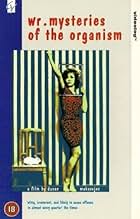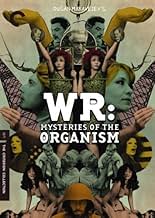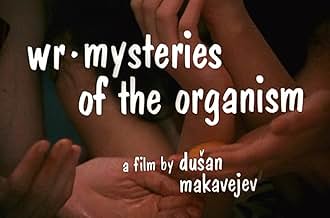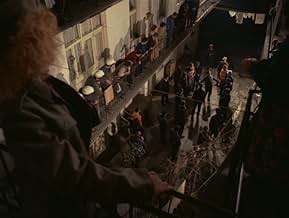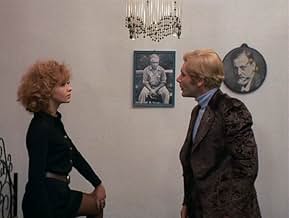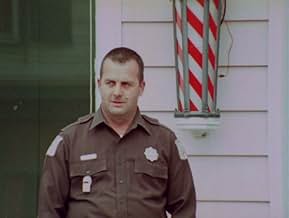PUNTUACIÓN EN IMDb
6,6/10
5,7 mil
TU PUNTUACIÓN
Un homenaje al trabajo del psicólogo Wilhelm Reich.Un homenaje al trabajo del psicólogo Wilhelm Reich.Un homenaje al trabajo del psicólogo Wilhelm Reich.
- Dirección
- Guión
- Reparto principal
- Premios
- 3 premios en total
Mikheil Gelovani
- Joseph Stalin
- (metraje de archivo)
Zedong Mao
- Self
- (metraje de archivo)
- (as Mao Zedong)
Wilhelm Reich
- Self
- (metraje de archivo)
David Henry Bradley Jr.
- Self
- (sin acreditar)
Reseñas destacadas
10theemu
Makavejev was always one of the clowns of the Third Cinema, and WR, his masterpiece, is no exception. Makavejev interweaves fiction, documentary, and found audio and video clips (a Stalinist propaganda film, electro-shock treatment footage) to create a fantastically bizarre but intelligent discussion of both the orgone energy theory of Wilhelm Reich and the relationship between Yugoslavia and the USSR in a post-Stalinist era.
I know. It sounds tedious, but it isn't. In fact, it's really fascinating. Among the clips Makavejev (a film theoretician in his own right, WR harkens back to the pre-Stalinist era of Soviet Montage) assembles are footage of performance art by the Yippie poet/singer Tuli Kapferberg and documentary clips of Jim Buckley, an editor for Screw Magazine, getting a mold of his penis made.
WR is bizarre, dogmatic, and at times, hard to watch, but having seen it twice now, I've come to appreciate its ways. By the time Vladimir breaks into song at the film's end, you'll be smiling too.
I know. It sounds tedious, but it isn't. In fact, it's really fascinating. Among the clips Makavejev (a film theoretician in his own right, WR harkens back to the pre-Stalinist era of Soviet Montage) assembles are footage of performance art by the Yippie poet/singer Tuli Kapferberg and documentary clips of Jim Buckley, an editor for Screw Magazine, getting a mold of his penis made.
WR is bizarre, dogmatic, and at times, hard to watch, but having seen it twice now, I've come to appreciate its ways. By the time Vladimir breaks into song at the film's end, you'll be smiling too.
Silly me I suppose. I had no idea what I was in for. I knew nothing about the movie and it caught me off guard.
At first I though this was being one of those artistic documentary like movies, in which a whole bunch of people are having deep thoughts about life and happiness. It took me a while to realize that it were all characters in this movie and it wasn't being a documentary at all. It's more a sort of satire and if you take it that way this movie is being pretty bearable and good enough for what it is.
Not that this movie is just for everybody though. It's the sort of cheaply made artistic movie, that's filled with metaphors and doesn't necessarily following a main plot line in it. Some people will hate it, while others shall absolutely love it. I was stuck in the middle somewhere.
Thing I liked about this movie is that it's also being the sort of movie that makes you think. It makes you think about what you're seeing and what the characters in it are trying to tell you with their actions and pieces of dialog. It's probably true that you could keep watching this movie over and over again and get more- or completely different things out of it, each time you watch it.
But it's still not my cup of tea. It's being a bit too vague and odd all at times and most of its themes don't even feel all that relevant anywhere in today's world and present morals and standards. Perhaps you should look at it more as a period piece, from a time when there still was sexual repression and communism and capitalism still seemed like a real threat to the world.
Still a great watch for some people. Just not for me.
6/10
http://bobafett1138.blogspot.com/
At first I though this was being one of those artistic documentary like movies, in which a whole bunch of people are having deep thoughts about life and happiness. It took me a while to realize that it were all characters in this movie and it wasn't being a documentary at all. It's more a sort of satire and if you take it that way this movie is being pretty bearable and good enough for what it is.
Not that this movie is just for everybody though. It's the sort of cheaply made artistic movie, that's filled with metaphors and doesn't necessarily following a main plot line in it. Some people will hate it, while others shall absolutely love it. I was stuck in the middle somewhere.
Thing I liked about this movie is that it's also being the sort of movie that makes you think. It makes you think about what you're seeing and what the characters in it are trying to tell you with their actions and pieces of dialog. It's probably true that you could keep watching this movie over and over again and get more- or completely different things out of it, each time you watch it.
But it's still not my cup of tea. It's being a bit too vague and odd all at times and most of its themes don't even feel all that relevant anywhere in today's world and present morals and standards. Perhaps you should look at it more as a period piece, from a time when there still was sexual repression and communism and capitalism still seemed like a real threat to the world.
Still a great watch for some people. Just not for me.
6/10
http://bobafett1138.blogspot.com/
The film for which director Dusan Makavejev is best known. It's similar to his later Sweet Movie, which I watched last week, in that it's made up of a bunch of disparate parts edited together. The most prominent thread is a documentary about sexual psychiatrist and (pseudo-)scientist Wilhelm Reich, a refugee from Nazi Germany who fled to the United States, where he was ironically persecuted and imprisoned when the government became suspicious of his work. A second thread is fictional, set in Eastern Europe, and is about a sexually liberated woman (Milena Dravic) promoting sexual freedom in Communistic language. There are other smaller threads about Andy Warhol's transsexual protégé Jackie Curtis, a hippie with a gun who runs around New York City, a woman who makes dildos and probably a couple of other ones I'm not remembering. The film covers some interesting areas, but it's too loose and not interested enough in any of these things to engage in them. The separate bits began to fall apart, for me at least. Sweet Movie was kind of a mess, but it was a well-structured masterpiece in comparison to WR. I liked Sweet Movie a whole lot more.
I completely disagree with the comments of the previous reviewer. Personally knowing very little about the Orgone or Wilhelm Reich, I derived great enjoyment from this film. In fact, I popped in on the TV just to get an idea of its style and structure (without planning to watch it right then) and ended up getting sucked in and watched it all the way through. Makavejev's filmmaking (that I've seen) is quite different from the norm, but not in an overly self-conscious or self-serving way, like Hal Hartley's efforts. "WR" is egoless, simply using film to draw parallels and make observations that are done quite effectively in Makavejev's unique style. It reminded me of the "I am Curious" films, but those are also a bit too self-conscious for me. I also highly recommend Sweet Movie, a later film of his. I only wanted to post these comments in light of the previous user's comments, as we should all remain aware of how subjective one's tastes are from another's. I didn't like the previous user making such blanket statements like "I suppose it might be watchable enough for people who are familiar with Reich, but if you aren't, then I strongly urge you to avoid this film at all costs." when tastes are obviously so variant - remember, I knew barely anything about WR or the Orgone, and enjoyed the film tremendously. Thanks for your time.
Directed by Serbian filmmaker Dusan Makavejev (also known for directing 'Sweet Movie', and the Australian produced 'The Coca-cola Kid'), the film mixes documentary and narrative cinema, to comment on the infiltration of Soviet Communism, sexual politics/sexual revolution, in a political satire. The main drive of the film to begin with is the work of Austrian-American psychiatrist and psychoanalyst, Dr Wilhelm Reich: His theories of Organon therapy (use of static electricity), and the connection between neuroses in people that is rooted in physical, sexual and social surroundings. This connects also with the work of Alexander Lowen, an American psychotherapist (and student of Reich's), who practices and teaches Bioenergetic analysis which uses therapeutic body work to associate the mind with the body, and in theory release repressed energy through the body sexually without the act of physical sex. I observed in these sequences a kind of connection to the work of Arthur Janov, and his primal scream therapy.
The narrative section of the film tells the story of Milena (Milena Dravic) and her sexually promiscuous flatmate Jagoda (Jagoda Kaloper), and their theories and speeches of sexual revolution: "The October revolution was ruined when socialism rejected free love". They meet a Russian communist figure skater, Ivica (Vladimir Ilivich), who they seduce. But Milena soon discovers that communism has no time for sexuality unless it is first met with physical violence. This seems to be a metaphor for the struggle against Stalinist communism within Yugoslavia since the second world war. But in the film Ivica seems somewhat deluded by the concept of communism (as he states, "communism is a Latin word meaning communal), whilst almost being made rigid by the sexual intentions of Milena.
The most interesting part of the film is the first part that focuses on the life and work of Wilhem Reich (hence the W. R. in the films title). He first started working in psychoanalysis with Sigmund Freud in the 1920's, but after writing books such as 'The Mass Psychology of Fascism', fled Austria for America, where he settled in Maine. He worked on his theories of orgone therapy, and developed the orgone accumulator, an organic box lined with lead that individuals would sit in and is theorised as giving both therapy to the bodies organs and to sexuality (The use of the orgone accumulator was even endorsed by William S. Burroughs.). Eventually Reich was arrested (more than likely the victim of situation - i.e. he was from behind the iron curtain), and viewed as insane - despite being tried in court. All of his books were burned in New York, supervised by the federal food and drugs administration agents (take from that what you will).
It is an interesting film. The different strands are connected by the theories of Wilhelm Reich. But it's one of those films that is probably more interesting to talk about than watch as it is incredibly slow moving, and at times seems to focus on activities (such as bioenergetic analysis), as group fad, and seems to almost fall into a 'new age' enlightenment message. Released in 1971, this would make sense, as the sexual revolution was in full 'swing'. Despite all of this it is a relatively enjoyable piece of cinema, with some nice ideas in it. But again, the life of W R far outshines the film as a whole.
www.the-wrath-of-blog.blogspot.com
The narrative section of the film tells the story of Milena (Milena Dravic) and her sexually promiscuous flatmate Jagoda (Jagoda Kaloper), and their theories and speeches of sexual revolution: "The October revolution was ruined when socialism rejected free love". They meet a Russian communist figure skater, Ivica (Vladimir Ilivich), who they seduce. But Milena soon discovers that communism has no time for sexuality unless it is first met with physical violence. This seems to be a metaphor for the struggle against Stalinist communism within Yugoslavia since the second world war. But in the film Ivica seems somewhat deluded by the concept of communism (as he states, "communism is a Latin word meaning communal), whilst almost being made rigid by the sexual intentions of Milena.
The most interesting part of the film is the first part that focuses on the life and work of Wilhem Reich (hence the W. R. in the films title). He first started working in psychoanalysis with Sigmund Freud in the 1920's, but after writing books such as 'The Mass Psychology of Fascism', fled Austria for America, where he settled in Maine. He worked on his theories of orgone therapy, and developed the orgone accumulator, an organic box lined with lead that individuals would sit in and is theorised as giving both therapy to the bodies organs and to sexuality (The use of the orgone accumulator was even endorsed by William S. Burroughs.). Eventually Reich was arrested (more than likely the victim of situation - i.e. he was from behind the iron curtain), and viewed as insane - despite being tried in court. All of his books were burned in New York, supervised by the federal food and drugs administration agents (take from that what you will).
It is an interesting film. The different strands are connected by the theories of Wilhelm Reich. But it's one of those films that is probably more interesting to talk about than watch as it is incredibly slow moving, and at times seems to focus on activities (such as bioenergetic analysis), as group fad, and seems to almost fall into a 'new age' enlightenment message. Released in 1971, this would make sense, as the sexual revolution was in full 'swing'. Despite all of this it is a relatively enjoyable piece of cinema, with some nice ideas in it. But again, the life of W R far outshines the film as a whole.
www.the-wrath-of-blog.blogspot.com
¿Sabías que...?
- CuriosidadesBanned in Yugoslavia immediately after release.
- Citas
Narrator: Comrade lovers, for your health's sake, fuck freely!
- Versiones alternativasAlthough this film was passed uncut for UK cinemas upon its original release, the 1995 Connoisseur Video release used an edited print which was shown on Channel 4 as part of a 1991 censorship season. This TV version used psychedelic computer generated masking techniques to hide some of the more explicit details, including genuine sex during the opening Soviet sex education film, the images on the wall paintings showing people masturbating, and all shots of Jim Buckley's penis as a plaster cast is made of it (which was obscured by digitally animated stars).
- ConexionesEdited from Klyatva (1946)
Selecciones populares
Inicia sesión para calificar y añadir a tu lista para recibir recomendaciones personalizadas
- How long is WR: Mysteries of the Organism?Con tecnología de Alexa
Detalles
- Fecha de lanzamiento
- Países de origen
- Idiomas
- Títulos en diferentes países
- WR: Mysteries of the Organism
- Localizaciones del rodaje
- Rangeley, Maine, Estados Unidos(Wilhelm Reich Museum/commune and town scenes)
- Empresas productoras
- Ver más compañías en los créditos en IMDbPro
- Duración1 hora 24 minutos
- Color
- Mezcla de sonido
- Relación de aspecto
- 1.37 : 1
Contribuir a esta página
Sugerir un cambio o añadir el contenido que falta

Principal laguna de datos
By what name was Los misterios del organismo (1971) officially released in India in English?
Responde

